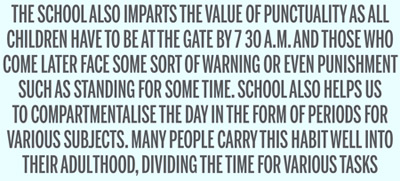
The disruption caused to both school and university education, first by the global Covid-19 pandemic and then by the economic crisis, has become a serious problem with many ramifications for the country’s future.
 Today, many children and teachers cannot attend school due to the fuel shortage and most schools have been closed as a result. This has again shifted the focus to online teaching and learning, though not every student and teacher has the necessary facilities to go online. Sometimes the lack of 4G signals and wired Internet has hampered online education even if devices are available.
Today, many children and teachers cannot attend school due to the fuel shortage and most schools have been closed as a result. This has again shifted the focus to online teaching and learning, though not every student and teacher has the necessary facilities to go online. Sometimes the lack of 4G signals and wired Internet has hampered online education even if devices are available.
But school (or university) is much more than textbook learning, which is the only aspect of education that online teaching facilitates. On the other hand, school or university offers a more well-rounded education that takes many more aspects into consideration.
Great childhood experience
 First, attending school is a great childhood experience that is then carried over to university for those who are lucky enough to enter the latter. School is a great leveller as all students, rich and poor, have to wear the same white (or sometimes blue) uniform without exception. The uniform itself imparts a sense of discipline as all parts of the uniform, down to the socks and shoes, must conform to the standards and rules set by the school, not to mention rules governing hair and personal hygiene or grooming.
First, attending school is a great childhood experience that is then carried over to university for those who are lucky enough to enter the latter. School is a great leveller as all students, rich and poor, have to wear the same white (or sometimes blue) uniform without exception. The uniform itself imparts a sense of discipline as all parts of the uniform, down to the socks and shoes, must conform to the standards and rules set by the school, not to mention rules governing hair and personal hygiene or grooming.
The school also imparts the value of punctuality as all children have to be at the gate by 7 30 a.m. and those who come later face some sort of warning or even punishment such as standing for some time. School also helps us to compartmentalise the day in the form of periods for various subjects. Many people carry this habit well into their adulthood, dividing the time for various tasks.
In person teaching also allows for individual attention for students, which is important especially for students who may lag behind in certain subjects. This is very difficult to do in an online setting. In person teaching also allows teachers to go through students’ workbooks and homework personally, which is also impossible in an online environment.
But school is not only about book learning per se. It is the first place where you make friends, some of whom will stay by your side for life. Friendship teaches us values such as sharing, caring and forgiving. The sharing of food among friends during the interval (and dare I say it, even while teaching is going on) is an established school ritual which can never be replicated by online education. Falling out with friends, sometimes for silly reasons, is rather common but then you learn to make up. And caring is sometimes extended to the many cats and dogs that roam the school compound.
School is the place where one learns to respect elders other than parents, I.e. teachers and other elders. School helps us to learn to respect the opinions of others, even if they differ from our own. And through sports that we do in school, we learn about the value of fair play – what matters is how you play the game, not whether you win or lose.
Importance of physical exercise
In fact, missing out on sports, Physical Exercise (PE) and other extracurricular activities is one of the biggest drawbacks of online education. As is well-known, sports help develop a healthy body as well as a sound mind. They also encourage team work.
 When I was schooling, the first period was allocated for PE, which set the tone for the rest of the day. School also offers many other activities such as clubs and societies focused on media, science, astronomy, quiz, debates, art and religion. School is also an ideal place to compare notes on individual hobbies such as collecting stamps and coins. Access to the Internet at home notwithstanding, it is simply more fun to learn more about these subjects in the company of friends and teachers.
When I was schooling, the first period was allocated for PE, which set the tone for the rest of the day. School also offers many other activities such as clubs and societies focused on media, science, astronomy, quiz, debates, art and religion. School is also an ideal place to compare notes on individual hobbies such as collecting stamps and coins. Access to the Internet at home notwithstanding, it is simply more fun to learn more about these subjects in the company of friends and teachers.
Other life lessons
School is also the first place where one learns about Nature and our relationship with it. Most, if not all, schools now have a garden or cultivation where children can plant saplings and track their growth. True, this can also be done at home but the collective element would be missing. Moreover, there are some plants that cannot be grown in a home garden but which can be accommodated in a school garden, which allows the students to learn more about them up close.
Some subjects can be done only in the school, including music, arts, dancing and even home science. Yes, it is possible to learn music online but then one would lose that total immersion and group activity offered by the school classroom.
Mismatch
Some time ago, the school curriculum offered hands-on job-oriented subjects such as carpentry and electronics, which have now been taken off. This was a truly myopic decision and is one of the causes for the present mismatch between educational qualifications and job market requirements. These subjects should be re-introduced, and they can only be done in person and not online. Moreover, practicals for subjects such as science and chemistry can only be done within the safe confines of a school laboratory.
Some online videos are available for such practicals, but they cannot be done at home in any case.
The morning assembly is another great school ritual that simply cannot be held online. This is where students can present dramas, speeches, songs and other creative work to highlight their talents. The students can also gain insights through lectures by teachers and outside guest speakers invited by the principal. In addition, the collective singing of the National Anthem and the School Anthem gives a sense of belonging to the country and to the school. Many schools also permit students to engage in religious activities during this period.
Educational tours
 But sometimes it is not possible to learn everything by being inside the school itself. This is where the school trip comes in. These trips can range from a walk to a nearby school for an exhibition or a trip to Anuradhapura to see the ancient religious structures. These educational trips help students to see the wonders of Sri Lanka for themselves and learn more about them, beyond the facts mentioned in the textbooks.
But sometimes it is not possible to learn everything by being inside the school itself. This is where the school trip comes in. These trips can range from a walk to a nearby school for an exhibition or a trip to Anuradhapura to see the ancient religious structures. These educational trips help students to see the wonders of Sri Lanka for themselves and learn more about them, beyond the facts mentioned in the textbooks.
Besides, the trips are a well-deserved break for children, who can sing and have fun during the up and down journeys. While it is indeed possible to tour any site in the world from your armchair thanks to the Internet, I would not miss a school trip for the world. It is an extension of school, but in a fun setting.
Unforgettable experience
But even simply getting to and from school can be fun, especially if you take the school bus, which is nowadays called the Sisu Seriya. When we were schooling, with the season ticket in the shirt pocket, we eagerly awaited the arrival of the school bus at the junction by around 6 45 a.m. The journey to school was a chance to catch up on the previous night’s TV (Knight Rider and Bionic Woman were big hits back then) and compare notes on school lessons. The journey back home from school was pure fun, with plenty of laughter. Even the teachers would join in the fun, forgetting the stiff upper lip for a moment. One will never get this overall experience through online learning. This does not mean that school per se is not fun – the interval gives an ideal opportunity for a bit of play and laughter. And if by any chance a teacher is absent for a certain period.....well, we all know how that goes.
More practical
In the end, school is an enlightening but also fun experience. It is the place that lays the foundation for our future and where we learn the skills of life that enable us to survive in the wider society. That would be hard to experience online. Attending school or university in person is definitely good for the health of children, both mentally and physically. In fact, studies conducted in the aftermath of the Covid pandemic, which forced the closure of schools for nearly two years, showed that many students showed signs of depression as a result of missing school and their friends.
It is, therefore, imperative for our education and other authorities to resolve the problems now affecting the education sector and create a conducive environment for holding in-person classes in schools without any interruption.
